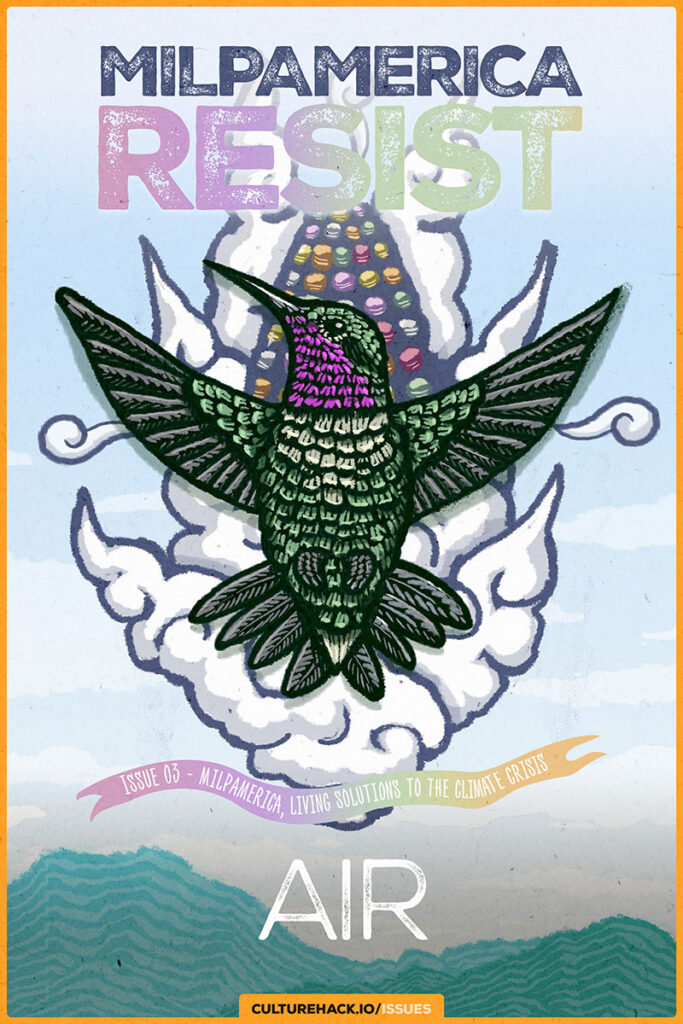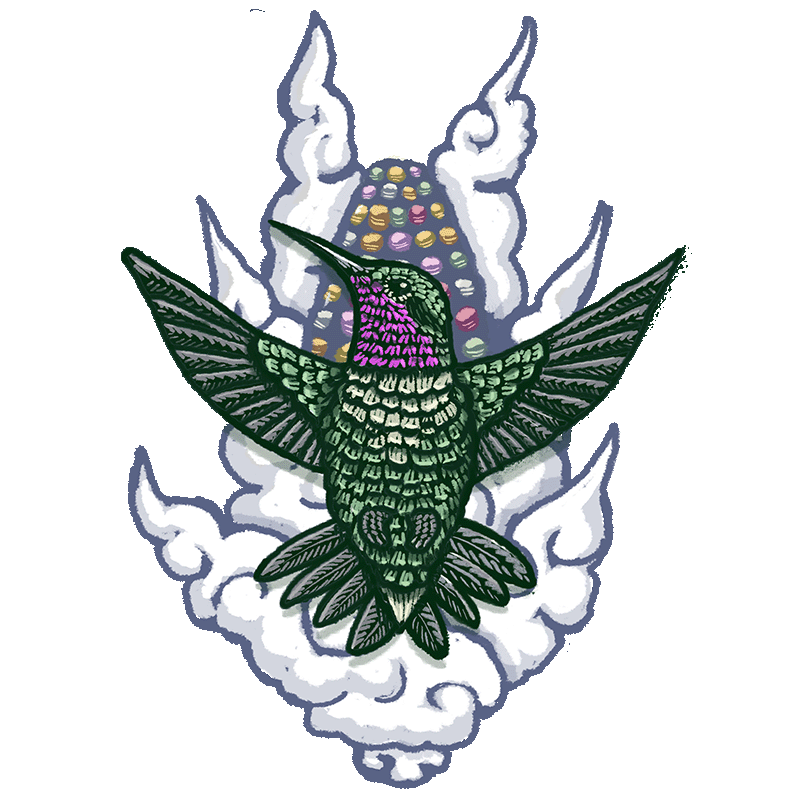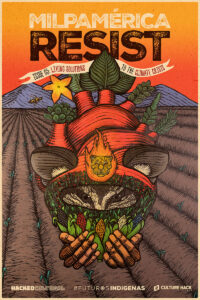Milpamérica – Air
Let’s reforest our territories and minds with ancestral wisdom, which is where our future resides. Let us remember that we are part of Mother Earth’s network of life.

The original text in Spanish is also available at Futuros Indigenas website.
Just like the seeds are prepared and the conditions needed to get the land ready have to be created before every sowing cycle, we have began the process to create a meeting point for cultural and gender diversities in the digital space we call Milpamérica Resists, which is a place for us to articulate our struggles before the dispossession of our land, our knowledges, our arts, our medicines, our narratives and our communal and Native discourses.
We have come together as communal beings who have come to acknowledge that we are all part of a network of life in a horizontal and spiral relation. In order to do this, during this process we have called upon the territory we belong to and have made a diagnosis of our land, riddled with dispossessions as it is and understanding that this is a process that has been operating ever since colonization started up to our current times. We were able to look at ourselves attentively in order to recover and rebuild our essence, our ancestrality, our present and our future.
Our decision to narrate from our own gazes and build narratives that allow us to reacquaint ourselves with our territories, our realities and the dispossessions we have gone through is fundamental for our determination to sow life and for us to be able to break free from a victimizing, paternalistic scheme that is imposed on Native peoples, to break free from a colonized mindset and to keep the party going because that is also an element of our resistances and existences.
Grupo Aire is composed by people who are resisting from their neighborhoods, rooted in their own sexual diversities, from the cultural mindsets that Native peoples have about their bodies; rooted in the epistemic resistances embodied by ancestral sciences before the cultural and territorial dispossession. We are people who, while resisting, also propose life alternatives before the climate crises. We don’t do it based on any arguments posed by the Sustainable Development Goals or guided by any public policy aimed to disguise reality before international forums, no. At Milpamérica Resists we have gathered and spoken from our diversities all of those who sow the maize and the vegetables in our backyards; all of those who have organized in our communities, neighborhoods and territories; all people who propose solidarity economies; people who harvest our crops with no agrochemicals; people who defend a dignified birth and a dignified life.
Our bodies are our territories, the place we inhabit. It is where we feel, think and relate to our ancestral territories. We understand our bodies as people and not as individuals. We are collective beings that are connected to Mother Earth.
In some cases, the sex or gender that those people who don’t see themselves as man or woman identify as has been defined ever since our ancestrality as a condition that the goddesses and gods bestow upon some. In our communities, these people have always existed and have been named long before the Spaniards arrived at Milpamérica. When the so-called conquistadors arrived, they persecuted, and destroyed all sexual diversity; in the name of their god-man they punished everything they couldn’t understand. 530 years later, we still name ourselves in our diversity using our ancestral languages. We carry on with the emancipation of the knowledge of our bodies as resistance and struggle.
The monoculture of ideas in time and space needs to be stopped. It is time for the way we inhabit our bodies-territories, which are connected and belong to the land, to bloom. We want to live our sexualities fully and we want to enjoy the pleasure our bodies can feel.
At Grupo Aire we talked about the implications that walking towards the cities and facing displacement has had on us. Our peoples have suffered violence as a result of the implementation of strategies aimed to uproot us from our territories. The megaprojects that wipe away our ways of living and displace us from our territories are responsible for the climate crisis.
Along with this, the practice of our spiritualities and religious rites —which involves walking hours and hours on end to get to a sacred place; to start our sowing cycle with a pray for rain; to perform cleanseas with plants that heal; being born in a temazcal; to hold collective prayers for every problem we need to resolve; to braid mutual aid networks— has yet to be stripped away from us by the evangelical destruction imposed upon us by the Europeans. Even though they murdered our wise astronomy scholars, even though they destroyed the amate trees that held our people’s collective memory and forced us to use the Gregorian calendar to leave or Milpamérica calendars behind, we have reclaimed our ancestral science.
All of the wisdom required to be able to read the stars demanded the articulation of structured knowledges that were systematized for thousands of years. Said knowledges allowed our ancestors to visualize the future. Said wisdom is now stored in the reading of some natural phenomena, such as corn. Our calendars are still being used, being named and being spoken about in the languages employed by those peoples who are still resisting the invasion of machines, technologies and economies because capitalism has turned all knowledge into a commodity.
The climate crisis implies the displacement of our spiritual practices, but before it, we state that we are all living solutions to this climate and life crisis.
Today, under the Western gaze, our knowledges are simply call “traditional wisdoms” and therefore are not considered worthy of being learned or inherited in these modern times. In the meantime, the West claims to be the only one in possession of universal and scientific knowledges. As a result of this epistemic racism, we suffer from an intellectual colonization: therefore, a scientific crisis translates into self-deprecation and the oblivion of indigenous knowledges.
At Milpamérica Resists, we are building roads to collectivize our struggles, resistances and sciences. We aim to keep on sowing the seeds kept in the repositories that are our languages, which is where our knowledges and sciences are encrypted. Let’s reforest our territories and minds with ancestral wisdom, which is where our future resides. Let us remember that we are part of Mother Earth’s network of life.

Lilia Heber Pérez Díaz – Commoner of Tlahuitoltepec Mixe, Oaxaca. Activist and researcher focusing on gender, culture, calendar and biodiversity. Communitarian radialist and adviser on the Ayuujk language and writing. She is part of the women’s organization Por Kää.
